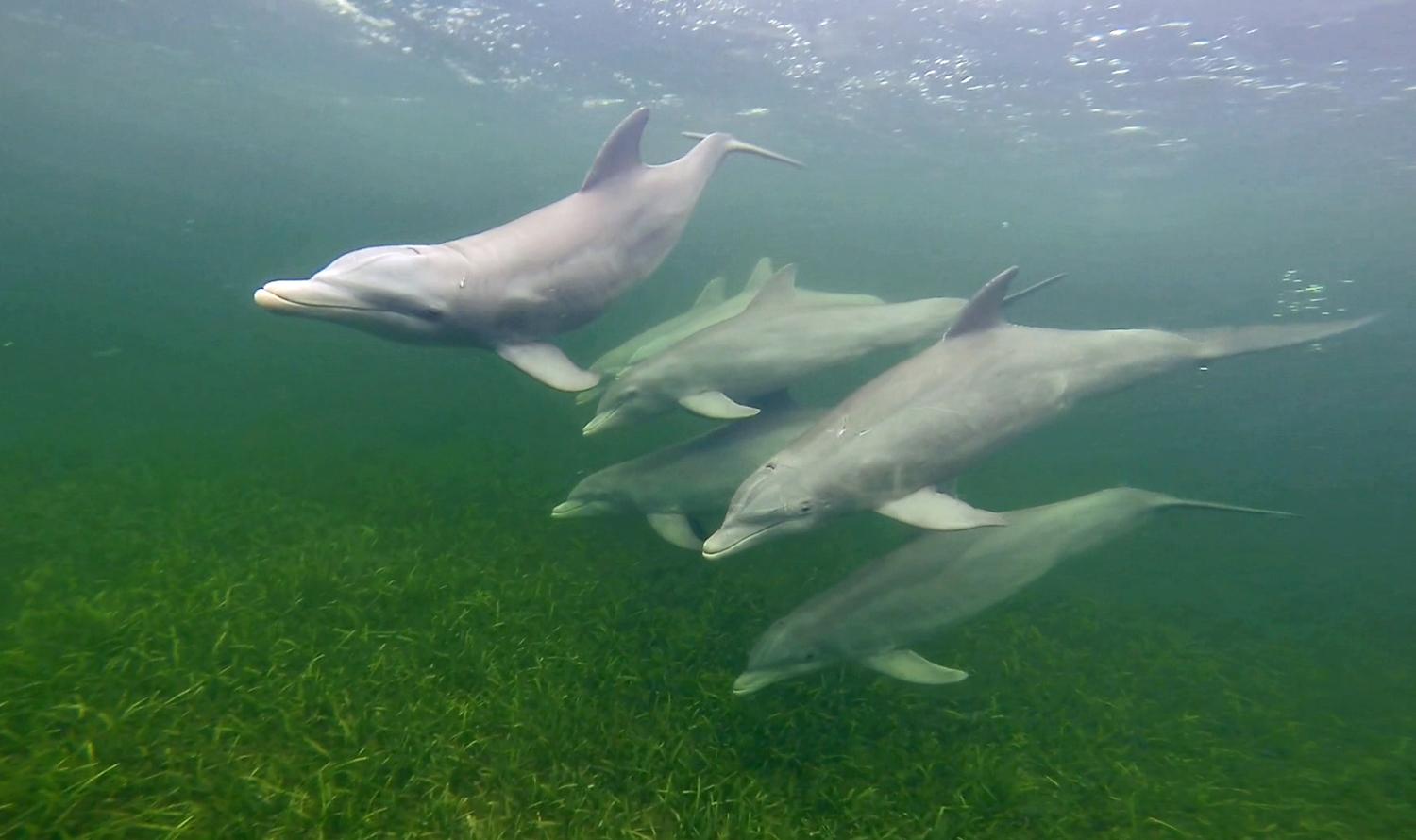BELIZE: Comparative Psychology: Marine and Cultural-Historical Studies in Belize
Credits: 4 (PSY 377) -- Fall semester course with winter travel to Belize
Course Instructor: Bob Swoap

Comparative psychologists study the behavioral patterns and minds of a wide array of animal species, including humans. There is an emphasis on discovering similarities and differences across species
that may shed light on evolutionary and developmental processes. Belize has a rich marine life as well as diverse cultural and language traditions (including Belizean Creole, Spanish, and English). We will use a comparative and cross-cultural lens to focus on marine species and on learning from the people of Belize. Following the on-campus component, we will embark on a 13-day field course to Belize to assist researchers from the Oceanic Society. This group is conducting several long-term studies documenting the abundance, distribution, and behavioral ecology of bottlenose dolphins, manatees, and sea turtles off the coast of Belize. While in the field, we will also learn about Belizean culture, discuss community-based planning for sustainable marine development, and meet Belizeans involved in protecting this exceptional ecosystem. We will also explore Mayan ruins in Belize and Guatemala. There will be good opportunities to immerse ourselves in the culture and the intersections of marine conservation and daily Belizean life.
PRAGUE: Reading Genre and Form: Fairy Tales and the Pop-Up Book
Credits: 4 (WRI 301)-- Spring semester course with travel in May
Course Instructors: Rachel Himmelheber and Lara Nguyen

The fairy tale and the pop-up book are two sophisticated artistic genres often misunderstood as being primarily intended for audiences of children. In fact, fairy tales and moveable books have historical roots as texts for adults. This course will serve as an introduction to the related genres of the fairy tale and the pop-up book, with a special interest in the folkloric and artistic traditions of the former Czechoslovakia/current Czech Republic. Coursework will include films, particularly Czech fairy tale features; feminist and queer fairy tale criticism and history; and slide lectures on moveable books and illustration styles and techniques. Students will learn form and technique and will apply this craft knowledge as they write their own fairy tales and craft their own pop-up books. During the semester, students will write drafts of their own fairy tales and will collaborate on a class pop-up book as we practice technique. Relevant Czech history, geography, plant life, and culture will inform this work, and the course will culminate in a two-week trip to Prague, Czech Republic where students will experience Czech architecture, art, nature, historical landmarks, and geography that they have studied as they complete their own fairy tale pop-up book projects. There will be free time in our travels for students to visit sites or areas relevant to their own work and interests, and as a group we will visit museums including The National Gallery in Prague, castles including Prague Castle and Hluboka Castle, churches including Sedlec Ossuary (known as the church made of human skeletons), theater including the National Theater and a puppet show, and natural exploration including hiking in the Bohemian countryside and mushroom foraging (considered a national pastime among Czechs) in the many forests of the Czech Republic.
BERLIN: Poets and Dictators: Art, Politics, and Philosophy in Modern Germany
Credits: 4 (PHIL 377)-- Spring Semester course with travel in May
Instructors: Jay Miller and Brian Conlan

This course will be an immersive experience that will provide students with a rich understanding of the major cultural and intellectual developments of modern Germany. We will begin our sojourn with the art, politics, and philosophy of the nineteenth century and trace the growing tensions among these through the rise and fall of Nazi Germany. Coupling in-depth analysis of key texts with on-site experience of the modern urban center of Berlin (with day trips to Weimar and Dessau), we will focus critical attention on the collision between artistic culture and political dictatorship that defines modern Germany.
LATVIA & SWEDEN: Traditions of Civic Engagement in Intercultural Context
Credits: 4 (SWK 377)-- Spring semester course with two weeks of travel in May-June
Instructors: Lucy Lawrence and Māra McLaughlin-Taylor

Through the distinct and multi‐disciplinary lens of civic engagement, students compare and contrast a myriad of interdependent social/environmental/political/economic/cultural issues in Latvia, a Baltic nation ruled by the Communist ideology of the Soviet Union for more than five decades, and the neighboring Scandinavian independent socialist democracy of Sweden. Students will examine the ways in which both Latvia and Sweden develop policies, programs, and practices that create a safety net to address current societal issues. Focus points of the course include intercultural comparisons of approaches to civic engagement that advance community self‐sufficiency while promoting active citizen participation. Students will have intercultural exchange and engagement through rigorous academic endeavor and transformational field study in both countries, including service-learning, building relationships with Latvian and Swedish students and professionals, exploring natural and historical landmarks on the Baltic coast, and experiencing traditions of food, art, music, and dance. This course fulfills General Education requirement AIM 5 Service Learning, General Education requirement AIM 15 Intercultural Perspectives, and PEG 2 of the Community Engagement Commitment.